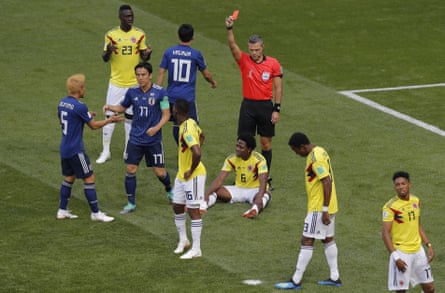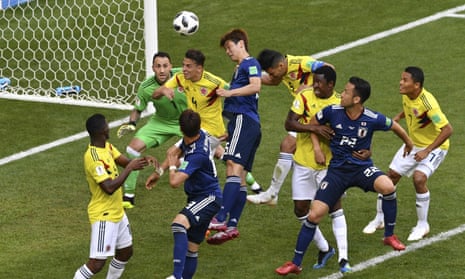It is difficult to imagine a team making a more calamitous start to a World Cup than Colombia did and unfortunately for José Pekerman and his players there was another blow to come on top of being a goal and a man down inside a chaotic first six minutes.
Yuya Osako delivered it with an emphatic second-half header to give Japan a victory that leaves Colombia, who were quarter-finalists in Brazil four years ago, with much to do if they are to progress from a tricky group.
The tone of a glorious afternoon in Saransk was set during that remarkable opening period. There were two minutes and 56 seconds on the clock when Carlos Sánchez was shown a straight red card for a deliberate handball inside the penalty area. It was the second-fastest sending off in World Cup history – José Alberto Batista’s dismissal for Uruguay against Scotland in 1986 after 54 seconds will take some beating – and Shinji Kagawa was not going to pass up the chance to put Japan ahead from the spot.
Down to 10 men and without James Rodríguez, who was not fit enough to start, Colombia looked like a team in a state of shock and, although they showed plenty of character and no little class to haul themselves back into the game, courtesy of Juan Quintero’s clever free-kick shortly before the interval, the numerical advantage started to tell in the second half and it was no real surprise when Japan regained the lead through Osako.
Colombia tried to respond again in the closing stages, when Rodríguez had a left-foot shot blocked, but playing the best part of an hour and a half with 10 men took a draining toll.
“Normally you prepare a match to play 11 v 11, so to lose one player in the first three minutes, such a crucial player, that’s not an easy thing,” Pekerman said. “We lost because we were worn down and tired.”
Japan were euphoric as they basked in the glory of an unexpected win – they are among the lowest-ranked teams at the tournament – and their first World Cup victory since 2010. It was a particularly satisfying afternoon for Akira Nishino, who took over as the manager only two months ago following the decision to sack Vahid Halilhodzic.
Japan impressed at times, in particular during the period leading up to Osako’s winner, yet there was no getting away from the fact that Sánchez’s red card was the defining moment and had a huge impact on the outcome.
Davinson Sánchez, who experienced a difficult match, has to take his share of the blame for the chain of events that unfolded. The Tottenham defender got in a terrible tangle dealing with a routine ball over the top that culminated in Osako scampering clear.
David Ospina, who was to make a couple of excellent saves in the second half, blocked Osako’s effort with his legs but the Colombia goalkeeper had only just managed to get to his feet when the loose ball fell to Kagawa.

The forward’s first-time shot would have put Japan ahead but Carlos Sánchez instinctively stuck out his right arm to block and Damir Skomina, the Slovenian referee, reached for his back pocket before brandishing a red card.
The former Aston Villa player complained bitterly and took several minutes to leave the field as Colombia players surrounded Skomina, yet he was left with no option. With the benefit of hindsight, Carlos Sánchez may well reflect he would have been far better off letting Kagawa score – a view reinforced when the Borussia Dortmund forward calmly rolled his spot-kick past Ospina, who dived the wrong way.
With Colombia trying to adapt to playing with 10 men – it was 31 minutes before Pekerman made a change and decided to replace Juan Cuadrado with Wilmar Barrios – space opened up for Japan to score a second goal. Takashi Inui and Osako squandered presentable chances before Quintero equalised in quite brilliant fashion after Radamel Falcao was fouled just outside the area.
Anticipating that the four players in the wall would jump, Quintero placed a low left-foot shot underneath them, catching out Eiji Kawashima, the Japan goalkeeper, who frantically tried to get across his line to keep the ball out. Kawashima had too much ground to make up and goal-line technology confirmed what just about everyone in the stadium suspected: Colombia were level.
It was deserved on the balance of play but the second half was a different story as Japan, who were encouraged at half-time by Nishino to be much more positive and to move the ball more quickly, started to dominate.
Pekerman introduced Rodríguez and Carlos Bacca to try to give Colombia some fresh attacking impetus but it was Japan who carried the greater threat. Ospina denied Inui and Osako before the latter, climbing above Santiago Arias, headed in Keisuke Honda’s corner.
“The game was an uphill struggle,” lamented Pekerman.

Comments (…)
Sign in or create your Guardian account to join the discussion